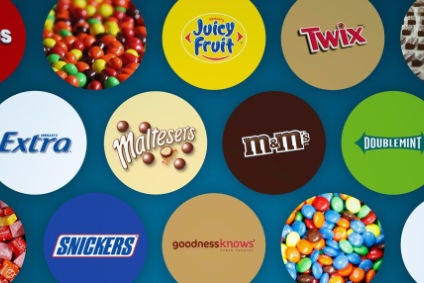Mars has moved to take full control of Wrigley, buying the minority stake held in the chewing gum maker by Warren Buffett. The deal could create a stronger competitor, particularly in the US, but there are some more strategic questions for Mars to answer, while the transaction can only add to Buffett’s firepower should he wish to make more acquisitions in the food industry, writes Dean Best.
Eight years after Mars Inc teamed up with Warren Buffett to buy Wrigley, the US food giant has bought the billionaire businessman’s stake in the chewing gum maker and is setting out to unify its confectionery operations.
Buffett took a minority stake in Wrigley when his Berkshire Hathaway investment fund helped fund Mars’ takeover of the Orbit gum firm in 2008. He put forward US$4.4bn towards Mars’ $23bn acquisition of Wrigley and paid $2.1bn for a stake in Mars’ Wrigley subsidiary when the transaction closed.
On Thursday (6 October), it emerged Mars had bought out Buffett, with the Snickers and Twix maker announcing the creation of Mars Wrigley Confectionery.
Mars had been running its non-chocolate brands like Starburst and Skittles through Wrigley but, with Buffett’s stake tied to Wrigley’s earnings, it is believed the shareholding meant the two businesses could not be fully integrated.
In a statement, Grant Reid of the office of the president and CEO at Mars, spoke of now having “an opportunity to rethink how we simplify our chocolate and Wrigley businesses” to bring what he called “a more holistic approach” to the confectionery sector.

US Tariffs are shifting - will you react or anticipate?
Don’t let policy changes catch you off guard. Stay proactive with real-time data and expert analysis.
By GlobalDataIt seemed likely there would also be an opportunity to look at headcount and Mars confirmed some jobs would go as the businesses were fully integrated. “Naturally, there will be some impact on associates where there is unnecessary role duplication. We anticipate most of the impact to be at the senior leadership and management levels,” Mars told us on Friday. However, the company was quick to add: “We don’t know the full implications at this time but this combination is about growth – not saving money – and thus we do not expect job loss to be significant.”
What the confectionery industry can expect is the establishment of Mars Wrigley Confectionery looks set to allow the privately-owned business a greater ability to use its scale, making what is already the world’s largest candy maker an even more formidable competitor.
“We think this move could free up Mars to potentially more fully leverage the combined scale of its legacy business and the Wrigley subsidiary, and thus perhaps enable it to become a more formidable competitor from a sales execution standpoint, which could have implications for Hershey, in our view,” Barclays Capital Andrew Lazar wrote in a note to clients on Thursday.
With Hershey finding the going tough in the US in recent months, Thursday’s news may have caused some furrowed brows in Pennsylvania. Hershey warned in July of the impact of lower-than-expected growth in the US confectionery category on its business; with its largest competitor in theory more able to sell and market in a more unified manner can only be a concern.
That said, the new Mars Wrigley Confectionery does face some strategic challenges, not least gum being, overall, a declining category and its chocolate arm, while housing some sizeable, multi-billion dollar brands, has a distinctly mainstream feel to it. Mars has, for example, the “hand-crafted” Ethel M brand in the US but it is only available online and in and around Las Vegas. Last summer, meanwhile, Mars launched the “healthy” snack brand Goodnessknows. Without wishing to play down the might of brands like Mars, Dove and Snickers, the company has only so far dabbled in premium, the part of the chocolate category driving growth, while, in the broader snacks arena, it has yet to make significant inorganic moves to diversify its portfolio in the same way Hershey and Mondelez International have.
Could, over time, Mars become more active on the M&A front to give its portfolio a more premium feel? Globally, confectionery remains a fragmented sector and clearly there are those doing business in the industry who believe there is consolidation to be done – Mondelez International’s interest in Hershey this summer is proof of that. Mars could also look to add brands with a more healthy positioning, though these will be, by the nature of the fledgling nature of the healthy segment, smaller, less-established businesses.
And what about Buffett and Berkshire Hathaway? Could the transaction fuel further moves in food from Buffett? He was, after all, the partner in 3G Capital’s acquisition of Heinz, as well as the private-equity firm’s subsequent move to merge the ketchup giant with Kraft Foods Group.
The rumours Buffett and 3G could soon strike again keep appearing – often with Mondelez touted as a possible target – and the sale of the billionaire’s stake in Wrigley will only fan the speculation.
At Barclays Capital, Lazar said on Thursday he had already been fielding questions from investors wondering about how Buffett’s deal with Mars could affect his and Berkshire’s ability and readiness to strike again.
Lazar said Berkshire’s second-quarter results suggested the firm had $42bn in cash it could use for M&A over and above the level it likes to have on-hand. “As such, we do not necessarily view the cash inflow from this preferred stock redemption as likely changing Kraft Heinz’s available funding sources in any material way,” Lazar said.
The proceeds from the Wrigley sale can only, however, add to Berkshire’s firepower should it wish to use Kraft Heinz for further consolidation.





